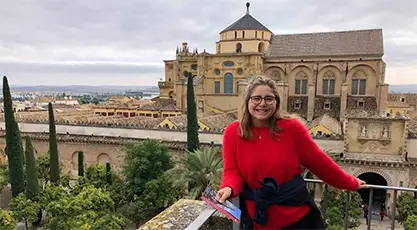Alumni Spotlight – Kimberly Bress
Bress Travels to Madrid as Fulbright Research Fellow

After graduating from UT, Kimberly Bress (’18) went to Madrid as a Fulbright Research Fellow at the Centro Alzheimer Fundación Reina Sofía in Madrid, Spain, where she worked in the Brain Tissue Bank and Pathology Department of the Center for Investigation of Neurodegenerative Diseases. That opportunity exposed her to the full gamut of Alzheimer’s pathology research, from the management of post-mortem brain donations to identifying disease proteins under the microscope. Among her new experiences was participating in an autopsy.
“My first autopsy is something I will never forget. Suited in full protective gear—a laboratory coat, dressing gown, hairnet and protective mask, shoe covers and two pairs of gloves—I watched the technician Javier perform each action with great care, yet swift confidence. Every so often, he would ask for a new tool, calling upon my still-developing Spanish medical instrument vocabulary. We started with
a slice of the scalpel from ear to ear over the dome of the head, slowly separating skin, muscle and connective tissue from the underlying cranium. Next, opening of the skull. As the fast whirring blade of a small chainsaw gently ground through bone, fine shavings swirled into the air like smoke. When the brain underneath was finally revealed, I found myself paralyzed with fascination. “Increible, no [Incredible, no]?” Javier asked. “Eso es lo que somos [This is what we are].” On my commute home from the laboratory later that evening, I paid a little bit more attention to the other metro riders. The world felt like a different place.”
Bress arrived in Madrid in early September 2018. Although she knew the general scope of what her research project would entail, following that of her initial Fulbright proposal, she did not expect to be assisting with human autopsies. She was initially overwhelmed and uncertain of her capabilities.
“It was my experience as a College Scholar that gave me the confidence to overcome this initial fear. Through the completion and defense of my thesis, in addition to crafting my own curriculum, I learned how to integrate knowledge gained from previous experiences to generate more meaning in my current ones. Being a College Scholars taught me how to think interdisciplinarily, communicate with mentors, and ask questions—skills which serve me well while working in a new field, foreign language, and challenging line of research. Most importantly, the program taught me to take initiative in my own learning. Reflecting on my goals and creating a unique path to reach them has enabled me to do the same in life beyond university.”
After her year in Madrid, Bress accepted a position as a post-baccalaureate fellow at the National Institutes of Health in the laboratory of Amir H. Gandjbakhche, head of the Section on Translational Biophotonics. Working in the NIH Clinical Center, she conducted research on the use of functional near infrared spectroscopy (fNIRS) to image brain activity in healthy and at-risk populations, including infants at risk for Autism Spectrum Disorder. The opportunity to work in clinical neuroimaging research at the NIH led Bress to pursue a career in medical science.
Bress entered the NIH-funded MD/PhD program at Vanderbilt University this past summer. She will pursue both a medical doctorate and a PhD in neuroscience. She thinks that her education through the College Scholars Program uniquely prepares her to balance the demands of this combined degree program, as well as embrace the dynamic nature of physician-scientist training.